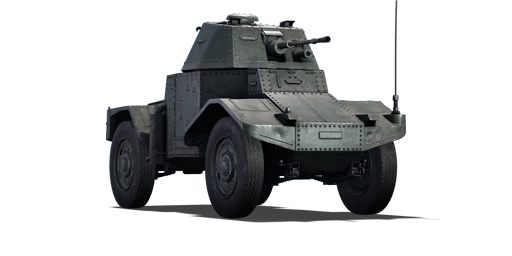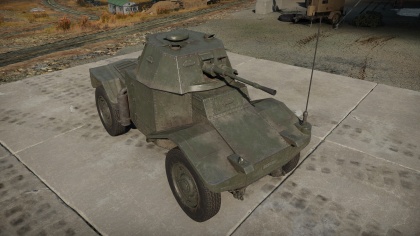Difference between revisions of "AMD.35"
Inceptor57 (talk | contribs) m (→Main armament) |
(→Pros and cons) |
||
| Line 55: | Line 55: | ||
* Very light APC round, doing comparatively little damage. Multiple rounds are usually required to obtain a single tank kill | * Very light APC round, doing comparatively little damage. Multiple rounds are usually required to obtain a single tank kill | ||
* APC round has comparatively poor penetration on vehicles with sloped armour in its rank | * APC round has comparatively poor penetration on vehicles with sloped armour in its rank | ||
| + | * Absense of anti-aircraft protection | ||
== History == | == History == | ||
Revision as of 15:58, 3 November 2019
Contents
Description
The AMD.35 is a rank I French light tank
with a battle rating of 1.0 (AB/RB/SB). It was introduced in Update 1.93 "Shark Attack".
General info
Survivability and armour
Describe armour protection. Note the most well protected and key weak areas. Appreciate the layout of modules as well as the number and location of crew members. Is the level of armour protection sufficient, is the placement of modules helpful for survival in combat? If necessary use a visual template to indicate the most secure and weak zones of the armour.
Mobility
Write about the mobility of the ground vehicle. Estimate the specific power and manoeuvrability, as well as the maximum speed forward and backwards.
Armaments
Main armament
The AMD.35 has the same gun as the AMR.35 ZT3: the SA34 L/72 (25 mm). Its high (950m/s) velocity give to its shells a very flat trajectory.
The penetrations abilities are acceptable, but the damages, because of the shell type (only APC), are very light. You will have to shoot multiple times in hope to destroy an enemy tank.
Additional armament
Some tanks are armed with several guns in one or more turrets. Evaluate the additional weaponry and give advice on its use. Describe the ammunition available for additional weaponry. Give advice on about how to use them and how to fill the ammunition storage. If there is no additional weaponry remove this subsection.
Machine guns
Offensive and anti-aircraft machine guns not only allow you to fight some aircraft but also are effective against lightly armoured vehicles. Evaluate machine guns and give recommendations on its use.
Usage in battles
Describe the tactics of playing in the vehicle, the features of using vehicles in the team and advice on tactics. Refrain from creating a "guide" - do not impose a single point of view but instead give the reader food for thought. Describe the most dangerous enemies and give recommendations on fighting them. If necessary, note the specifics of the game in different modes (AB, RB, SB).
Pros and cons
Summarise and briefly evaluate the vehicle in terms of its characteristics and combat effectiveness. Mark its pros and cons in a bulleted list. Try not to use more than 6 points for each of the characteristics. Avoid using categorical definitions such as "bad", "good" and the like - use substitutions with softer forms such as "inadequate" and "effective".
Pros:
- High top speed in a straight line on paved and hardened surfaces. (80 kph AB, 72 kph RB)
- Vehicle geared to achieve same top speed both in drive and reverse, allowing for a quick retreat
- Good frontal armour in its class
- Good armour penetration of the main gun, capable of penetrating the frontal (unsloped) armour of most enemy tanks in its rank at 500 m distance
- Fast reload speed of the main gun
- Large crew for a vehicle of its class, increasing survivability
Cons:
- Poor cross-country performance
- Poor fording and obstacle-crossing capabilities
- Wheeled vehicle, unable to turn on the spot
- Lightly armoured and vulnerable flanks and rear
- Slow turret transverse
- Limited ammo storage (48 rounds for the main gun, 800 rounds for coaxial machine gun)
- Relative low muzzle velocity, dramatic decrease of penetration power above 500 m range
- Very light APC round, doing comparatively little damage. Multiple rounds are usually required to obtain a single tank kill
- APC round has comparatively poor penetration on vehicles with sloped armour in its rank
- Absense of anti-aircraft protection
History
The AMD.35 or Automitrailleuse de Découverte, also known as the Panhard 178 was a French 4x4 specialised long-range armoured reconnaissance car built by Panhard. Designed to a 1931 specification to replace older models of armoured cars, Panhard completed a prototype in October of 1933 which was evaluated in January and February of 1934. Out of four competing models, built by Panhard, Renault, Berliet and Latil, the Panhard design was considered the best, being a highly advanced design for its time. After further trials by the French Cavalry, the Panhard 178 was accepted for production as the AMD Panhard Modèle 1935. Initial use revealed some issues like engine overheating and cracking of the gun sight, resulting in a major modification program in 1937 which saw numerous modifications introduced.
In order to obtain a vehicle capable of a long-range and relatively high speed for its class, Panhard designed the 178 to be relatively light. As a result, the vehicle was relatively lightly armoured, ranging from 7 mm armour bottom plates to 13 mm flank armour and 26 mm frontal armour. As a result, the vehicle had a road speed of 72 kph (45 mph) and a range of about 300 km (186 miles), but due to its long wheelbase and leaf-spring suspension, its off-road top speed lay at 42 kph (26 mph) and its wading and trench-crossing capacity lay at just 60 cm (2 ft). The vehicle also had its shortcomings: it had a cramped interior, poor cross-country performance, a slow turret rotation speed and a weak clutch.
Unusually for a French light reconnaissance vehicle, the Panhard 178 was equipped with a 2-man turret at a time when even most of their tanks had one-man turrets: the AP3X turret housed a commander and gunner, who had a 25 mm Hotchkiss Modèle 34 main gun and 7.5 mm Reibel coaxial machine gun at their disposal. The turret also housed a reserve machine gun which could be mounted on top for anti-aircraft defence, but which was rarely mounted in practice. The Hotchkiss gun had tungsten rounds at its disposal, capable of penetrating up to 50 mm of armour, however, these rounds performed poorly when confronted with angled armour. Already early on the poor armour-penetrating capabilities of the Hotchkiss Modèle 34 were recognised, and work was started on up-arming the AMD.35 with a 47 mm SA 35 gun. Early designs would have seen the gun fitted in the rear driver's post creating a tank-destroyer with two AT guns (the turreted Hotchkiss gun and a hull-mounted SA 35 gun), but this was abandoned in favour of a vehicle with a turreted SA 35 in an enlarged turret. Even so, by May of 1940, in the response of events in Poland, plans were already being drawn up to phase out production of the lightly armoured AMD.35 in favour of the more heavily armed and armoured AM40P.
Events decided differently, and following the German invasion of France in May of 1940, the AMD.35 proved its worth, outclassing its German counterparts. In a number of direct confrontation, German reconnaissance vehicles proved vulnerable to the Panhard's Hotchkiss gun, while their own 20 mm main gun proved ineffective against the Panhard. As a result, following the defeat of France, the Panhard 178 was taken into production for the German army as the Panzerspähwagen P204 (f). In German service, some of these vehicles were refitted with the 37 mm KwK 36; in 1944, a batch of captured ex-Vichy Panhards were fitted with the 50 mm KwK 38 L/42 or L/60 in an open turret.
Following the Liberation of France in 1944, production of the Panhard 178 was reinstated for the French Army, and consideration was given to up-arming the design with the 75 mm SA 45 L/32. A larger turret was designed which could fit this gun, however, before production started the decision was taken to fit the new Panhard 178B with the pre-war 47 mm SA 35 instead. The up-armed Panhard 178B was produced for the French Army, entering service after the War: it served both in France and its colonies, such as Syria, Tahiti, Madagascar and Indo-China. The Panhard 178B was phased out of French army service in 1960; examples taken over by Syria following its independence in 1946 continued service into the mid-1960, when it was finally phased out in favour of Soviet-supplied equipment.
Media
Excellent additions to the article would be video guides, screenshots from the game, and photos.
See also
Links to the articles on the War Thunder Wiki that you think will be useful for the reader, for example:
- reference to the series of the vehicles;
- links to approximate analogues of other nations and research trees.
External links
Paste links to sources and external resources, such as:
- topic on the official game forum;
- encyclopedia page on the tank;
- other literature.
| France light tanks | |
|---|---|
| AMC.34/35 | AMC.34 YR · AMC.35 (ACG.1) |
| H.35/39 | H.35 · H.39 · H.39 "Cambronne" |
| AMX-13 | AMX-13 (FL11) · AMX-13-M24 · AMX-13 · AMX-13 (SS.11) · AMX-13-90 · AMX-13 (HOT) |
| Wheeled | AML-90 · AMX-10RC · Vextra 105 |
| AMD.35 | AMD.35 · AMD.35 (SA35) |
| E.B.R. | E.B.R. (1951) · E.B.R. (1954) · E.B.R. (1963) |
| Other | FCM.36 · R.35 (SA38) · Char 25t · MARS 15 · VBCI-2 (MCT30) |
| Austria | SK-105A2 |
| Great Britain | ▄Crusader Mk.II |
| Netherlands | CV 9035NL |
| USA | LVT-4/40 · ▄M3A3 Stuart |





